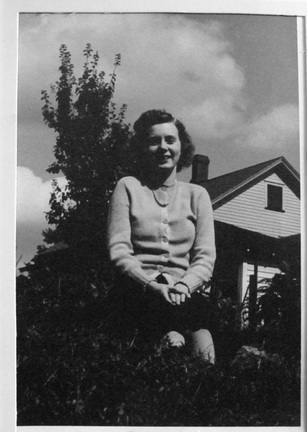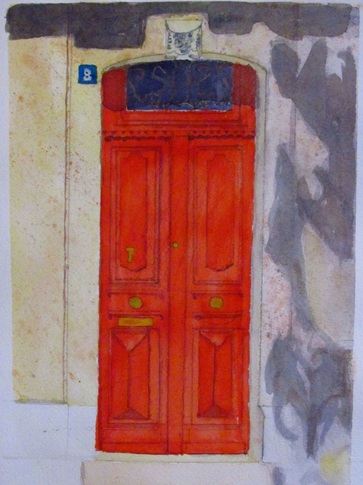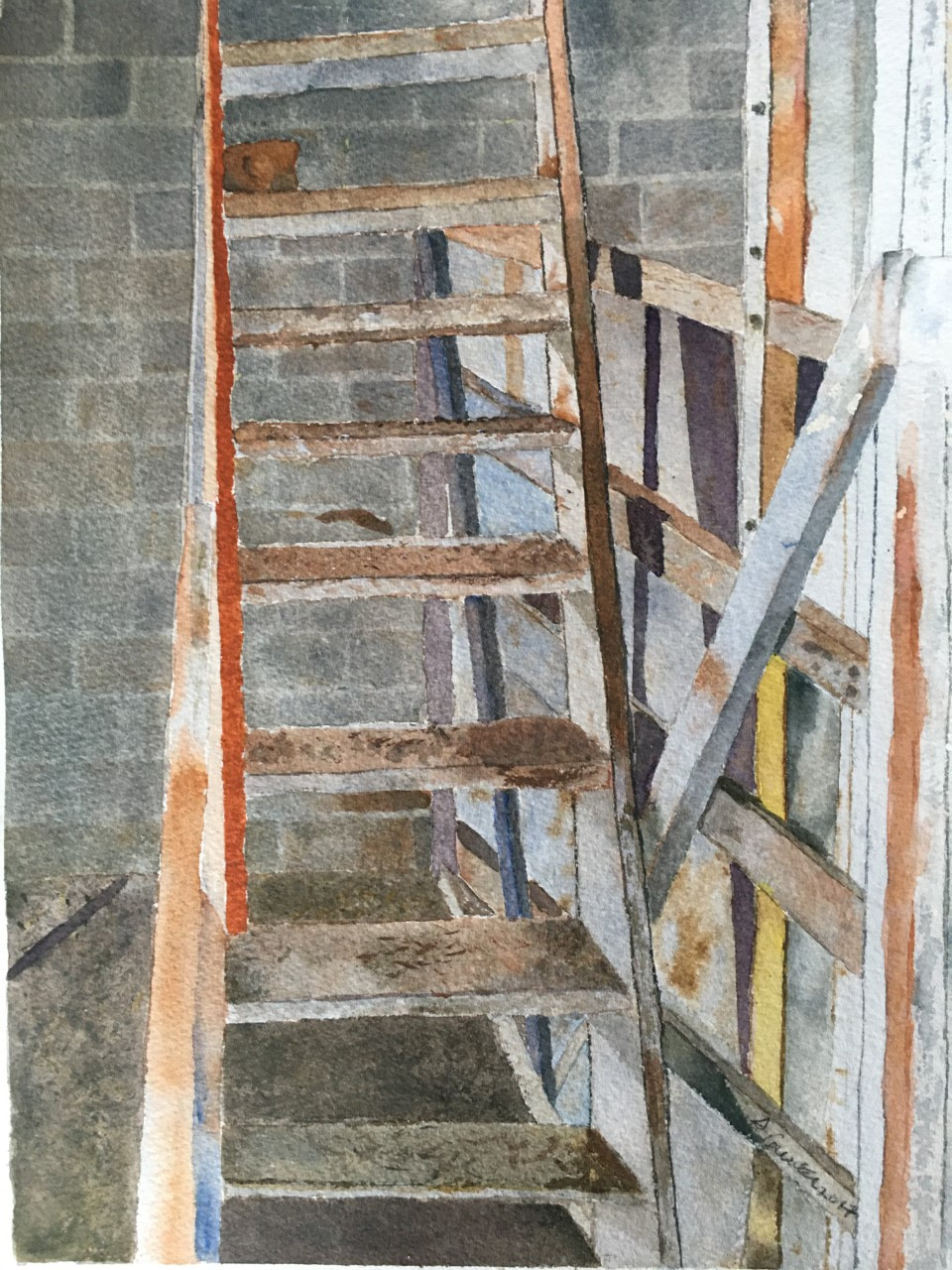The title of this Sunday morning’s posting comes from a Richard Wilbur poem, “Love Calls Us to the Things of This World.” I read this poem decades ago as an undergraduate and it has remained with me; it concerns paying attention to our daily activities—like laundry. Today I read it as a call to put behind the bad things that happened and focus on the life at hand, even trying to make something of the bad events that occur to every one of us. It’s worth a read if you have time.
For me the worst thing happened thirty-two years ago today, when my beloved mother took her own life in a hospital in Kittaning, Pennsylvania. She had been a polio victim as a child, and in her early sixties she succumbed to the things that we now know plague those who have suffered this terrible disease: physical pain, mental pain, even in her case substance abuse. I knew of the disease’s physical effects (one of her legs was considerably shorter than the other and she had a pronounced limp), but as a young person I never considered the mental ravages that follow an attack of polio.
When I got the call from the hospital’s social worker, though, while I knew things had been very wrong with my mother for years, I nearly ripped the red phone from the wall in my anger. How could this have happened?
I was living in rural Colorado at the time with my husband and two very young sons, and I had just returned from visiting her for what became the last time. She had been hospitalized with severe depression and was under a suicide watch, but she managed to elude her keepers to find the peace she sought. She was a very bright woman who had had limited opportunities. In the thirties money was tight, and although her beloved younger brother went to Penn State, she did not go. (I don’t know now how much of that was her choice and how much financial exigencies.) She married, had three girls, lived in the same house where she was born with her mother still living there, and worked. Her job was at our local steel mill, Cyclops, and she did accounting, but she was paid as an assistant secretary. That was the fifties—since she was not the main breadwinner, she was not paid as much as men doing equivalent tasks. She loved music and she loved to learn. When I was in high school I remember that she took a night stenography course—she studied hard and took pleasure in each assignment. She was the secretary of our local United Methodist Church, a member of the Women’s Club, she sang in the church choir, and she loved to play show tunes on our old upright piano.
Hardly the profile of a desperate suicide. So that is what I had to come to terms with. I loved my mother deeply, though I think that even as a child I knew something was wrong with her. While I have many warm memories of my grandmother Ruby, I remember almost nothing of my mother before my teen years. I struck out at her once physically, something I remain ashamed of, but I was trying to reach her—she always eluded my grasp, somewhere out of reach around a corner.
I think only having small children saved me from going under after her death; I could not abandon boys of two and five years. One night in Colorado, after they were asleep, I ran out into the snow in my bare feet screaming.
“This could not have happened to my mother!”
Some days I ran down the mountain roads near us as fast as I could go, reliving each event over and over in my mind as if that could change them.
The other thing that saved me was going back to graduate school six months after her death. A month or so after her death, Bill was transferred to South Carolina. Though I had not considered more graduate school, I realized I would be living close to a major university. I had been out of school for over a decade, but I took the graduate record exam and did well enough to be admitted, even though the only writing samples I could produce were reviews I had written for the Salida newspaper on the Aspen Music Festival.
So, that August, I began with Chaucer and Shakespeare’s histories, giving me the long view that I badly needed. I loved being in class, and I loved sitting up at night reading these magical stories. The following year I found something that helped me even more: I enrolled in James Dickey’s poetry writing class. (For those of you who don’t know his work, he wrote a novel called Deliverance, and he played the sheriff in the movie version.) Although he was rumored to be an alcoholic and a womanizer (and he probably was both those things), he was a transformative teacher. He strolled into class wearing cowboy boots and a big white cowboy hat, and he slung a large worn brown leather satchel onto the desk. We students were so in awe of him that we sat in perfect silence while he pulled out one book after another and read to us aloud in a deep, rhythmic voice. I was nearly hypnotized—and utterly inspired. I wrote, and wrote, and wrote, many of my poems about my mother. Some of them I eventually published, though many of them were less than good. I had found the place to put my feelings, my despair. I made something.
Today I am in a poetry workshop again, with visiting poet Andrea Hollander, and I am rediscovering how wonderful it is to put things into material forms. I am also painting, learning watercolor, and recently I have begun a series of doors—I have ten of them, from photos I have taken in various places abroad. Briefly I asked myself why I was intrigued with doors, but I didn’t probe because I thoroughly enjoy painting them. But when I combined my efforts at watercolor with writing a poem for this week’s assignment, at least one reason emerged.
The last time that I ever saw my mother, she walked with me down a long blank hall to a heavy metal door. I hugged her goodbye and walked through it; she stayed behind. The door swung shut with a heavy clang and locked; I listened to her limp back down the hall, dragging her left foot after her right. I never saw her again.
I am attaching the poem, as it illustrates how art and writing can help bring us back to the world. I think any kind of creative or mental activity that produces something (tangible or intangible) can do the same thing. I lost a dear friend this week, and another dear friend’s mother died, so this poem is for them and for my mother.
Composition: Mixed Media
I paint to learn what my eyes barely register,
things hidden to me: cast shadows, a latch,
a spectre whose form floats behind the drapes.
I study the image I shot, its hues and patterns:
copper door, stained windows, the stone of walls
and sun faded stone, the blur of a doorway’s curve.
I sketch the door. I mask it. I pour
Holbein’s opera rose over phthalo blue.
My scumbling suggests the shapes.
I’m not done. The three hundred pound
cold press needs to dry. I eye it in my mirror
to see whether I like it better backwards.
Like Dodgson’s Alice, I’ve found a world.
Once I was young; I lost someone. I glaze
a green on top of my pain: I paint a door.
For me the worst thing happened thirty-two years ago today, when my beloved mother took her own life in a hospital in Kittaning, Pennsylvania. She had been a polio victim as a child, and in her early sixties she succumbed to the things that we now know plague those who have suffered this terrible disease: physical pain, mental pain, even in her case substance abuse. I knew of the disease’s physical effects (one of her legs was considerably shorter than the other and she had a pronounced limp), but as a young person I never considered the mental ravages that follow an attack of polio.
When I got the call from the hospital’s social worker, though, while I knew things had been very wrong with my mother for years, I nearly ripped the red phone from the wall in my anger. How could this have happened?
I was living in rural Colorado at the time with my husband and two very young sons, and I had just returned from visiting her for what became the last time. She had been hospitalized with severe depression and was under a suicide watch, but she managed to elude her keepers to find the peace she sought. She was a very bright woman who had had limited opportunities. In the thirties money was tight, and although her beloved younger brother went to Penn State, she did not go. (I don’t know now how much of that was her choice and how much financial exigencies.) She married, had three girls, lived in the same house where she was born with her mother still living there, and worked. Her job was at our local steel mill, Cyclops, and she did accounting, but she was paid as an assistant secretary. That was the fifties—since she was not the main breadwinner, she was not paid as much as men doing equivalent tasks. She loved music and she loved to learn. When I was in high school I remember that she took a night stenography course—she studied hard and took pleasure in each assignment. She was the secretary of our local United Methodist Church, a member of the Women’s Club, she sang in the church choir, and she loved to play show tunes on our old upright piano.
Hardly the profile of a desperate suicide. So that is what I had to come to terms with. I loved my mother deeply, though I think that even as a child I knew something was wrong with her. While I have many warm memories of my grandmother Ruby, I remember almost nothing of my mother before my teen years. I struck out at her once physically, something I remain ashamed of, but I was trying to reach her—she always eluded my grasp, somewhere out of reach around a corner.
I think only having small children saved me from going under after her death; I could not abandon boys of two and five years. One night in Colorado, after they were asleep, I ran out into the snow in my bare feet screaming.
“This could not have happened to my mother!”
Some days I ran down the mountain roads near us as fast as I could go, reliving each event over and over in my mind as if that could change them.
The other thing that saved me was going back to graduate school six months after her death. A month or so after her death, Bill was transferred to South Carolina. Though I had not considered more graduate school, I realized I would be living close to a major university. I had been out of school for over a decade, but I took the graduate record exam and did well enough to be admitted, even though the only writing samples I could produce were reviews I had written for the Salida newspaper on the Aspen Music Festival.
So, that August, I began with Chaucer and Shakespeare’s histories, giving me the long view that I badly needed. I loved being in class, and I loved sitting up at night reading these magical stories. The following year I found something that helped me even more: I enrolled in James Dickey’s poetry writing class. (For those of you who don’t know his work, he wrote a novel called Deliverance, and he played the sheriff in the movie version.) Although he was rumored to be an alcoholic and a womanizer (and he probably was both those things), he was a transformative teacher. He strolled into class wearing cowboy boots and a big white cowboy hat, and he slung a large worn brown leather satchel onto the desk. We students were so in awe of him that we sat in perfect silence while he pulled out one book after another and read to us aloud in a deep, rhythmic voice. I was nearly hypnotized—and utterly inspired. I wrote, and wrote, and wrote, many of my poems about my mother. Some of them I eventually published, though many of them were less than good. I had found the place to put my feelings, my despair. I made something.
Today I am in a poetry workshop again, with visiting poet Andrea Hollander, and I am rediscovering how wonderful it is to put things into material forms. I am also painting, learning watercolor, and recently I have begun a series of doors—I have ten of them, from photos I have taken in various places abroad. Briefly I asked myself why I was intrigued with doors, but I didn’t probe because I thoroughly enjoy painting them. But when I combined my efforts at watercolor with writing a poem for this week’s assignment, at least one reason emerged.
The last time that I ever saw my mother, she walked with me down a long blank hall to a heavy metal door. I hugged her goodbye and walked through it; she stayed behind. The door swung shut with a heavy clang and locked; I listened to her limp back down the hall, dragging her left foot after her right. I never saw her again.
I am attaching the poem, as it illustrates how art and writing can help bring us back to the world. I think any kind of creative or mental activity that produces something (tangible or intangible) can do the same thing. I lost a dear friend this week, and another dear friend’s mother died, so this poem is for them and for my mother.
Composition: Mixed Media
I paint to learn what my eyes barely register,
things hidden to me: cast shadows, a latch,
a spectre whose form floats behind the drapes.
I study the image I shot, its hues and patterns:
copper door, stained windows, the stone of walls
and sun faded stone, the blur of a doorway’s curve.
I sketch the door. I mask it. I pour
Holbein’s opera rose over phthalo blue.
My scumbling suggests the shapes.
I’m not done. The three hundred pound
cold press needs to dry. I eye it in my mirror
to see whether I like it better backwards.
Like Dodgson’s Alice, I’ve found a world.
Once I was young; I lost someone. I glaze
a green on top of my pain: I paint a door.



 RSS Feed
RSS Feed